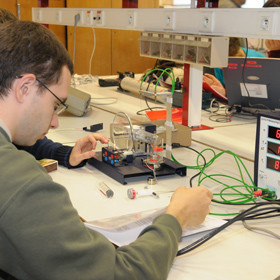Physics

Objectives
The variety of teaching approaches (conceptual or application-oriented, possibility of internships in laboratories or companies leading to either entry into the workforce or further studies) is suited to students with various needs and ambitions and leads to many career options.
Licence
LDD3 : Physique - Cursus ENS Paris-Saclay
Master 1
Master 1 Physique - Voie Irène Joliot-Curie (ENS Paris-Saclay)
- Training delivered in French.
- Refer to the program ans application procedures.
Eligible public
- Be registered as a student at ENS Paris-Saclay
- Foreign students (excluding nationals of the European Economic Area, Andorra, Switzerland or Monaco) whose country of residence is covered by the Études en France scheme.
- Student registered in the Physique - Voie Irène Joliot-Curie (ENS Paris-Saclay) Master 1 in 2022-2023 and authorised to repeat the year
Entry requirements
Application dates: 1 March to 2 July 2023
Master 2
Master 2 : Formation à l'enseignement supérieur en physique
- Refer to the program and application procedures.
- Program delivered in French.
- Program open to international students.
Direct outlets: preparation for the agrégation in physics (access to agrégation posts in secondary and higher education).
Master 2 : Physics, Engineering and Chemistry for Biology (PhysEnBio)
- Refer to the program and application procedures.
- Program delivered in English.
- Program open to international students.
This two-year course trains future researchers or engineers in the theoretical foundations and experimental practice of generic technologies located upstream of nanobiology and telecommunications based on molecular photonic principles.
Careers
Generally speaking, the Université Paris-Saclay Master of Physics leads to the following graduate destinations:
- doctoral study (basic or applied physics, intersections of physics)
- academia, research and development
- private sector executive
- research engineer in public agencies
- business services requiring advanced scientific and methodological knowledge
- end of an engineering school curriculum (for university students after the M1)
- secondary school teaching
